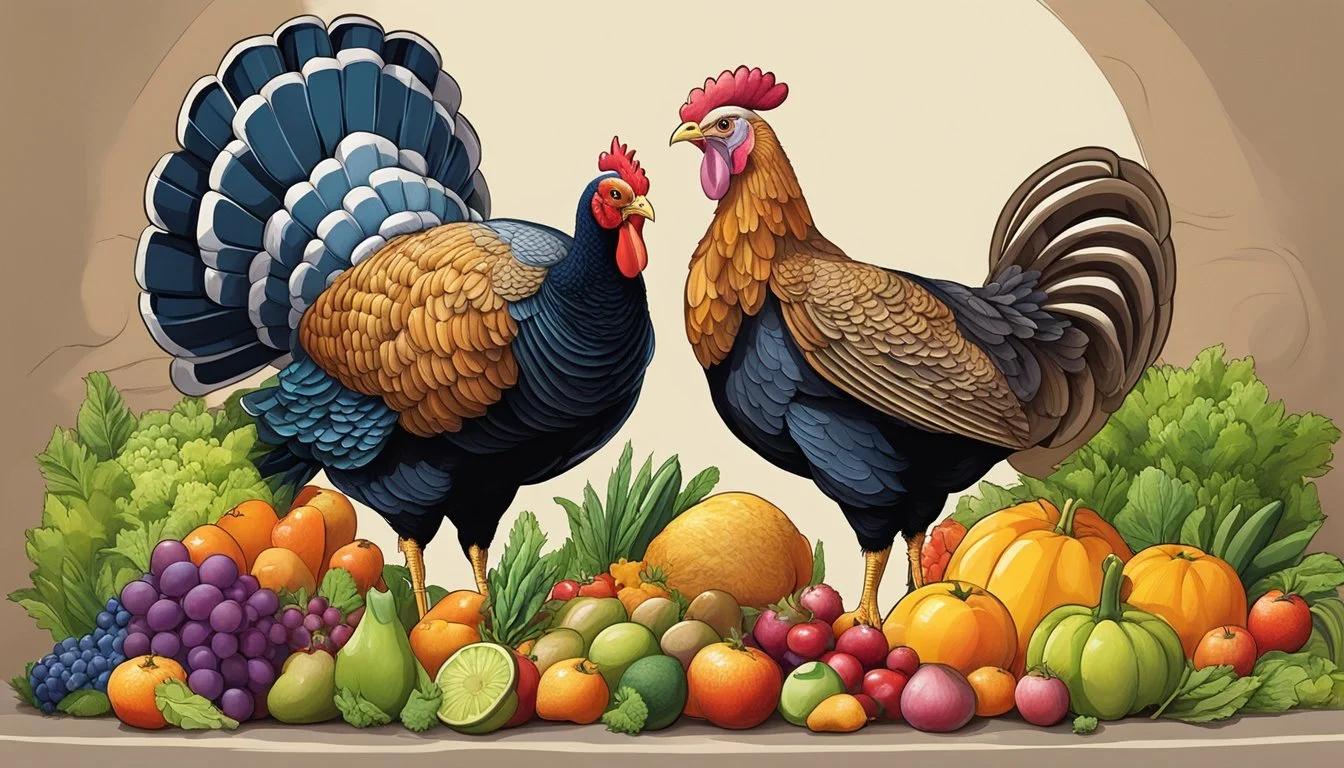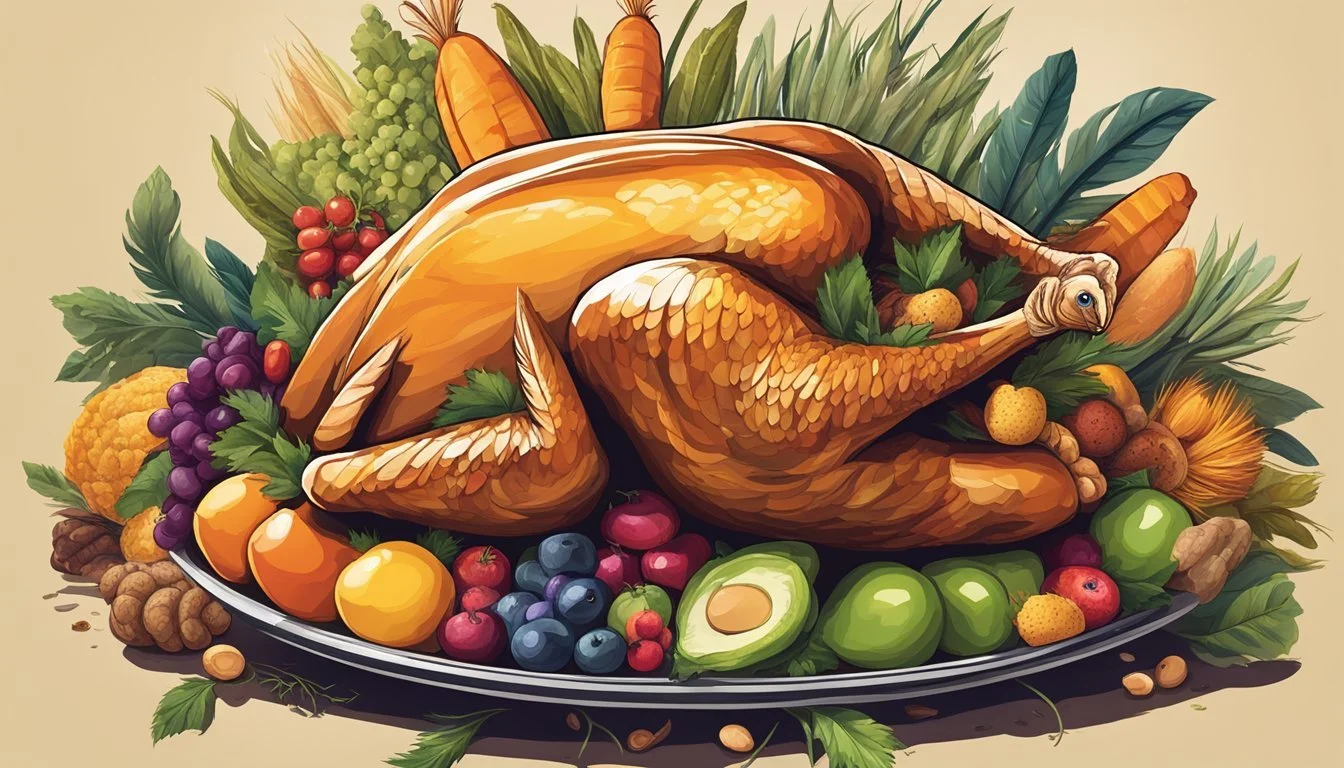Turkey vs. Chicken
A Carnivore's Guide to Poultry Nutrient Density Explained
When it comes to choosing between turkey and chicken, understanding their nutrient profiles can help you make an informed decision. Turkey meat stands out for its richer content of vitamins B3, B6, and B12 compared to chicken, which is slightly higher in vitamin B5. For protein seekers, chicken breast edges out turkey by offering one gram more protein per ounce.
Comparatively, turkey meat contains more essential nutrients overall. It provides higher levels of vitamin B2 and folate, which are crucial for energy production and cell growth. Additionally, turkey contains vitamin D, an important nutrient that chicken lacks.
Whether you're enjoying poultry as part of a carnivore diet or seeking a dependable source of lean protein, both turkey and chicken have their distinct nutritional advantages. Opting for a variety of both can ensure a more balanced intake of essential nutrients.
Nutritional Profiles of Turkey and Chicken
Turkey and chicken both offer ample sources of protein and essential nutrients, but they vary in terms of vitamins, minerals, and fat content.
Protein Content in Turkey vs. Chicken
Both turkey and chicken are excellent sources of protein, supporting muscle growth and overall health. Chicken breast contains approximately 31 grams of protein per 100 grams, while turkey breast offers about 29 grams in the same serving size.
Turkey is slightly higher in essential amino acids, which are crucial for muscle repair. Both meats are prized in high-protein diets, but the choice often boils down to personal preference and dietary needs.
Fat Qualities and Quantities
Fat content varies notably between turkey and chicken. Chicken meat tends to have higher overall fat content, particularly in the skin, which includes saturated fats.
Turkey breast: Low in fat, with about 1 gram per 100 grams.
Chicken breast: Slightly higher, with around 3.6 grams per 100 grams.
Turkey’s fat profile is characterized by higher amounts of polyunsaturated and monounsaturated fats, which are considered beneficial for heart health. Chicken meat, especially dark meat and skin, is richer in saturated fats, which should be consumed in moderation.
Vitamin and Mineral Density
Vitamins and minerals present in these meats differ in concentrations and benefits. Turkey is particularly rich in vitamin B12, niacin (B3), and zinc.
Vitamin B12: Essential for neurological function and DNA synthesis, with turkey offering nearly 2.5 times more than chicken.
Vitamin B3 (Niacin): Important for metabolic health, found abundantly in both, but chicken provides higher daily coverage.
Iron: Both provide iron for oxygen transport in the blood, but turkey has slightly more heme iron.
Vitamin E: More prevalent in turkey meat, beneficial for antioxidant protection.
While chicken meat shines in selenium and vitamin B6, it lacks vitamin D, found in moderate amounts in turkey. Recognizing these differences can help in making informed dietary choices.
Health Benefits and Risks
Turkey and chicken offer a range of health benefits tied to their nutritional content. They can impact cardiovascular health, weight management, metabolic conditions like diabetes, and even cancer.
Cardiovascular Considerations
Turkey and chicken are both lean protein sources contributing to heart health. Turkey has slightly less fat than chicken, which can be beneficial in reducing cholesterol levels.
Higher concentrations of vitamins B6 and B12 in turkey support cardiovascular function. Chicken’s iron content is also valuable, as iron deficiencies can lead to heart-related issues. Replacing higher-fat meats with these poultry options can reduce the risk of cardiovascular disease.
Weight Management and Obesity
Both turkey and chicken are low in calories and high in protein, helping with weight loss and management. Turkey, with fewer calories and fat per serving, offers a slight edge in battling obesity.
A diet rich in lean proteins like turkey and chicken promotes satiety, reducing overall calorie intake. The nutrients in these meats also play a role in muscle maintenance during weight loss, which is crucial for metabolic health.
Diabetes and Metabolic Health
For diabetics, turkey and chicken are excellent protein choices due to their low carbohydrate content. Removing carbs helps regulate blood sugar levels and improves insulin sensitivity.
Turkey’s higher vitamin B3 (niacin) content aids in controlling blood sugar levels. Chicken provides zinc, essential for insulin production and glucose utilization. These benefits make both meats good options for managing diabetes and metabolic health.
Cancer Risks and Proteins
Proteins found in turkey and chicken support cellular repair and function. The high-protein content might not directly reduce cancer risks, but it offers benefits like daily maintenance of body functions.
Turkey’s abundance in vitamin D might also provide an indirect benefit in reducing cancer risk, given its role in cell growth regulation. Chicken's zinc and iron are also crucial for maintaining a healthy immune system, potentially reducing cancer risk by supporting overall health.
Poultry in Various Diets
Turkey and chicken, as versatile proteins, fit well into different dietary regimes like the carnivore and ketogenic diets, catering to various nutritional needs and restrictions.
Carnivore Diet Implementation
In a carnivore diet, which centers on consuming animal-based foods exclusively, both chicken and turkey serve as notable protein sources. Chicken breast, being leaner, provides high protein with minimal fat. This makes it suitable for those monitoring fat intake.
Turkey also holds a place due to its nutrient density and relatively low-fat content. For carnivore dieters, it's crucial to focus on the quality of meat. Opting for pasture-raised or grass-fed poultry can enhance nutritional benefits, adding valuable vitamins and minerals to the diet.
Inclusion in Ketogenic Regimens
The ketogenic diet emphasizes high-fat, low-carb food choices to maintain ketosis. Chicken thighs and drumsticks, with their higher fat content, are favorable for this diet. The fat helps provide the necessary energy while keeping carbohydrate intake minimal.
Turkey, particularly the dark meat, also fits well within this framework. It's a beneficial option for keto adherents looking for variety in their protein sources. Both meats can be prepared in ways that adhere strictly to keto guidelines, offering delicious and satisfying meal options.
Allergies and Restrictive Diets
For those following restrictive or elimination diets due to allergies, poultry can be a safer protein choice. Chicken and turkey are commonly excluded when identifying triggers, providing low-allergenic options once reintroduced.
In restrictive diets, where nutrient density is paramount, both meats offer essential vitamins and minerals. They are easier to digest compared to some red meats and less likely to cause digestive distress.
These attributes make turkey and chicken ideal for various dietary needs, ensuring balanced nutrition without compromising dietary goals.
Comparing Poultry to Other Animal Products
Poultry such as chicken and turkey offers unique nutritional benefits compared to other animal products like red meat, fish, and dairy. By understanding these differences, you can make better choices to fit your dietary needs and preferences.
Red Meat and Pork
Red meats, including beef and lamb, are often higher in fat and calories compared to poultry. A 100g serving of beef can contain up to 20g of fat, while the same amount of chicken breast has around 3.6g. Pork, especially lean cuts, offers a balance between red meat and poultry in terms of fat and protein content.
A notable advantage of red meat is its richness in iron and zinc, essential for various bodily functions. However, red meats are usually higher in saturated fats, which can impact cholesterol levels and heart health. Poultry, particularly turkey, often contains less saturated fat, making it a healthier choice for cardiovascular health.
Fish and Seafood
Fish and seafood are generally lower in fat compared to red meat and poultry, with many types rich in omega-3 fatty acids, which are beneficial for brain and heart health. Salmon, for instance, is celebrated for its high omega-3 content. A 100g serving of salmon provides approximately 2g of omega-3, while chicken and turkey have relatively negligible amounts.
Eel and other fatty fish also contribute significantly to omega-3 intake. Seafood typically offers high-quality protein and is rich in vitamins and minerals such as vitamin D, which supports bone health. Compared to poultry, fish and seafood are also lower in cholesterol, making them an excellent option for those looking to manage blood lipid levels.
Dairy Products and Their Alternatives
Dairy products like cheese, milk, and yogurt are excellent sources of calcium and vitamin D, which are vital for bone health. A single cup of milk provides about 30% of the Recommended Daily Allowance (RDA) for calcium. Yogurt also contributes probiotics that support gut health.
For those who are lactose intolerant, plant-based alternatives such as almond or soy milk are widely available. These alternatives are often fortified with calcium and vitamin D, making them nutritionally comparable to traditional dairy products. Compared to poultry, dairy products offer different essential nutrients, emphasizing the importance of a balanced diet incorporating both for overall health.
Consequences of Overconsumption
Excessive consumption of turkey or chicken, while nutritionally beneficial in moderate amounts, can have significant health implications. These include impacts on heart health, inflammation, and cholesterol levels.
Impact on Heart Health
The overconsumption of poultry can contribute to heart health issues. Diets high in animal protein, particularly if prepared with additional fats and salts, may increase the risk of cardiovascular disease and stroke.
Elevated sodium levels from processed poultry products like deli meats and bacon can lead to heightened blood pressure. Additionally, the saturated fats present in poultry, especially with the skin on, can raise LDL cholesterol levels. A balance must be maintained to safeguard heart health.
Contributions to Inflammation and Chronic Disease
Consuming large quantities of poultry can also affect inflammation and chronic disease prevalence. Chronic inflammation is linked to diseases such as type 2 diabetes and cardiovascular conditions.
Processed poultry products often contain preservatives and additives that may exacerbate inflammatory responses. Furthermore, high intake of animal proteins, including poultry, has been associated with increased levels of inflammatory markers. This can contribute to conditions like arthritis and other chronic ailments.
Cholesterol Levels and Balance
Regular overconsumption of turkey and chicken can disrupt cholesterol balance. Poultry contains cholesterol, and eating it in excess can lead to an imbalance, raising overall cholesterol levels in the blood.
While lean poultry can be part of a heart-healthy diet, excessive intake of fattier cuts can increase HDL and LDL cholesterol. It's essential to monitor the types and amounts of poultry consumed to maintain healthy cholesterol levels and reduce the risks associated with high cholesterol.
Culinary Applications and Preparation
Turkey and chicken serve different culinary needs, each offering unique textures and flavors suitable for various dishes. Understanding the best cooking techniques, seasoning, flavor pairings, and making use of bones and broths is essential for optimal results.
Cooking Techniques
Chicken is versatile and can be cooked using numerous methods. Roasting at 375°F (190°C) until the internal temperature reaches 165°F (74°C) ensures safe and juicy meat. Grilling adds a smoky flavor, while slow-cooking makes it tender.
Turkey Cooking Techniques
Turkey, being larger, often requires more careful preparation. Roasting a whole turkey is popular, typically at 325°F (163°C) to ensure thorough cooking. Ground turkey can be used in stews or patties, which need to be cooked to the same safe internal temperature of 165°F (74°C).
Seasoning and Flavor Pairing
Seasoning Chicken
Chicken pairs well with a variety of herbs and spices. Salt, pepper, garlic, and rosemary are common favorites. For a tangy flavor, lemon juice or zest can be added. Marinating chicken helps in infusing more flavors.
Seasoning Turkey
Turkey’s robust flavor benefits from stronger seasoning. Sage, thyme, and paprika complement turkey's taste. A good marinade with olive oil, garlic, salt, and citrus works well. Using brine before roasting can make the turkey moist and flavorful.
I really suggest buying salt and pepper online for an easy shopping experience!
Bone Broth and Extracts
Chicken Bone Broth
Chicken bones are rich in marrow, providing a nutritious base for bone broth. Simmer the bones with salt, vegetables, and herbs for several hours to extract collagen and minerals. This broth adds depth to soups and sauces.
Turkey Bone Broth
Turkey bones also make excellent broth. Larger bones contain more marrow, giving a richer flavor to the broth. Simmering turkey bones with pepper, onions, and celery not only extracts nutrients but also enhances the final dish.
By utilizing different cooking methods, seasoning thoughtfully, and making full use of bones, both chicken and turkey can be prepared to maximize their culinary potential.
Comparative Food Sustainability
The sustainability of turkey and chicken meat production involves analyzing their environmental impact and ethical concerns. Key areas of focus include resource consumption, greenhouse gas emissions, and treatment of animals.
Environmental Impact of Poultry Farming
Poultry farming contributes to environmental sustainability in several ways. Chicken farming tends to be more efficient in terms of feed conversion ratios, meaning chickens require less feed to produce a given amount of meat compared to other livestock. This efficiency results in lower overall resource consumption, including land and water.
Turkey farming also showcases favorable feed conversion ratios, although slightly less efficient than chickens. Both turkey and chicken farming yield lower greenhouse gas emissions per unit of protein than larger livestock such as cattle. Managing waste, maintaining biodiversity, and ensuring sustainable practices are critical to minimizing the ecological footprint of poultry farming.
Ethical Considerations in Meat Production
Ethical considerations in poultry farming typically concern animal welfare and humane treatment. Intensive chicken farming practices highlight issues like overcrowding and limited access to outdoor spaces, raising concerns about the quality of life of the animals. Some farms implement better living conditions to address these issues.
For turkeys, similar ethical concerns exist. Turkeys are often raised in confined environments, which can lead to stress and disease. Ethical meat production practices emphasize providing adequate space, enrichment, and humane slaughtering methods. Consumers increasingly demand higher welfare standards, pushing producers toward more humane and ethically sound practices.
Adopting sustainable and ethical approaches in poultry farming can lead to better environmental outcomes and improved animal welfare, benefiting both producers and consumers.
Supplementary Nutrients and Alternatives
While turkey and chicken are rich in essential nutrients, it is beneficial to consider other sources and methods to enhance nutritional intake. Incorporating plant-based foods alongside poultry can provide a more balanced diet, and supplements can ensure proper nutrient absorption.
Plant-Based Sources of Nutrients
Plant-based foods are excellent supplements to a poultry-rich diet. Vegetables such as spinach and broccoli are high in folate and B vitamins, particularly B2 and B6. Fruits, especially citrus varieties, provide a hefty dose of vitamin C, which is absent in meat. Legumes, including beans and lentils, offer fiber and additional B vitamins. Nuts and seeds are rich in essential fatty acids and minerals like zinc and magnesium. Grains, such as quinoa and brown rice, add dietary fiber and complex carbohydrates. Combining these with poultry can create a nutrient-dense meal plan.
Supplement Usage and Nutrient Absorption
Supplements can be valuable in ensuring the body receives all necessary nutrients. For those consuming a carnivore diet, Vitamin B12 supplements might be less critical due to the high B12 content in turkey, but it's essential to monitor levels regularly. Folate and iron supplements are more vital for people not consuming enough plant-based foods. The bioavailability of nutrients from supplements can vary; thus, it is advisable to take them with food to enhance absorption. Vitamin D supplements may be necessary, as both turkey and chicken provide minimal amounts. When choosing supplements, one must consider their form and quality to ensure the best results.
If you want vitamin B12, folate, iron, and vitamin D, shopping online is your best choice!
Adverse Effects and Dietary Concerns
While turkey and chicken are nutritious proteins, they can present adverse effects and dietary concerns that should be taken into account.
Food Allergies and Sensitivities
Food allergies to poultry, although less common than other food allergies, do occur. Symptoms can range from mild skin reactions like psoriasis to severe allergic responses. For some, poultry can be a hidden trigger for symptoms, making it crucial to monitor one's reaction closely when consuming turkey or chicken.
Sensitivities often manifest as digestive issues such as constipation. Those with known sensitivities should consult a healthcare provider before incorporating poultry into a restrictive diet, such as a carnivore diet. This is particularly vital for individuals with histories of food-related allergies.
Potential for Nutritional Deficiencies
Relying solely on poultry for nutrient intake can lead to deficiencies. While turkey and chicken are rich in proteins and certain vitamins, they may lack nutrients like Vitamin C, potentially leading to scurvy. A diverse diet is necessary to avoid such deficiencies.
Individuals on restrictive diets like the carnivore diet face specific risks. Poultry does not supply significant amounts of omega-3 fatty acids or certain minerals. Despite being nutrient-dense, an exclusive focus on poultry can result in imbalances impacting overall health, including risks of depression due to lack of variety and certain essential nutrients.














